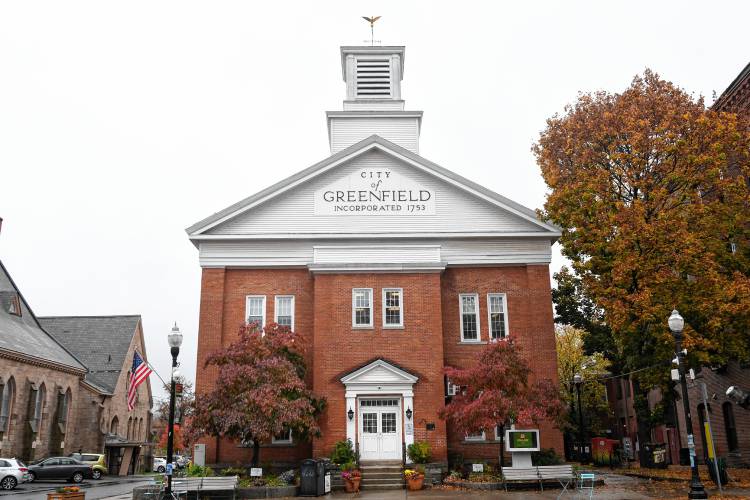Greenfield City Council approves creation of Opioid Use and Prevention Commission

Greenfield City Hall. STAFF FILE PHOTO/PAUL FRANZ
| Published: 05-23-2025 2:58 PM |
GREENFIELD — A new Opioid Use and Prevention Commission is tasked with finding the best ways to spend the city’s opioid settlement funds and inform the city on issues related to opioid use, overdose and addiction prevention.
City Council voted unanimously to approve an ordinance establishing the commission, which will consist of seven members representing both the city and those who are directly impacted by the opioid crisis, at a Wednesday meeting.
The commission will provide a $3,000 annual stipend to each of its members. Although the stipend quantity is larger than that which other city volunteers — including city councilors — earn, Precinct 5 Councilor Marianne Bullock said at Wednesday’s meeting that the quantity makes sense given the career hurdles those in recovery face. Bullock helped lead the charge of assembling the city’s multi-disciplinary opioid advisory task force last year.
“When you’re a person with lived experience and you identify as being in recovery in a professional setting, you’re then often blocked from advancing in a professional setting in your life,” Bullock said. “This commission will address issues around opioid use in the city. … You would have a place to go if you want to ask questions, like when the benches were removed from downtown — this is a commission that could have been tasked with addressing some of those issues.”
Greenfield has already received $551,204 out of its $1.7 million in national opioid settlement funds. Announced in July 2021, the federal funds set Massachusetts up to receive more than $500 million of the $26 billion settlement, according to the Attorney General’s Office. The agreement, according to then-Attorney General Maura Healey, resolved investigations and litigation over pharmaceutical companies’ roles in fueling the opioid epidemic.
Sarah Ahern, of Choice Recovery Coaching, spoke in support of the new commission during public comment, highlighting the fact that it would put those who have been directly impacted by opioid addiction.
“Living experience accounts of those of us who’ve experienced substance use, who have navigated homelessness or incarceration, who have lost someone to substance use, who are not just service recipients, but who are knowledge holders,” Ahern said. “We have gone through the failures in our system and we’ve survived them. We understand what works and what doesn’t, because we’ve been there, and for too long, people with lived experiences were invited into the room, but rarely into positions of power.”
Last month, Bullock addressed health care professionals to speak about the new commission at a roundtable discussion on substance abuse attended by Attorney General Andrea Joy Campbell, explaining that rural Massachusetts is not “pathologically” predisposed to addiction, but rather, the region lacks the resources that are available to more wealthy areas of the state.
Article continues after...
Yesterday's Most Read Articles
 Mohawk Trail students to see new staff, new codes of conduct upon Aug. 27 return to school
Mohawk Trail students to see new staff, new codes of conduct upon Aug. 27 return to school
 Bear-y unwelcome: Why MassWildlife says it’s time to ‘break up’ with bird feeders
Bear-y unwelcome: Why MassWildlife says it’s time to ‘break up’ with bird feeders
 ‘A place that’s just for us’: Greenfield mom to become homeowner through Habitat for Humanity build
‘A place that’s just for us’: Greenfield mom to become homeowner through Habitat for Humanity build
 New library at 38 Avenue A in Turners Falls preferred over Carnegie renovation
New library at 38 Avenue A in Turners Falls preferred over Carnegie renovation
 Meeting physician retention goals: Two Greenfield Family Medicine Residency grads stay local
Meeting physician retention goals: Two Greenfield Family Medicine Residency grads stay local
 My Turn: Spectre of public and affordable as scare tactics
My Turn: Spectre of public and affordable as scare tactics
Bullock clarified, at Wednesday’s City Council meeting, that the commission will hold community feedback sessions and surveys to ensure that its decisions are informed by the public’s needs.
Mayor Ginny Desorgher also spoke in support of the resolution, noting that she believes putting those who are directly impacted by addiction at the forefront of allocating funding is a practice that could be replicated by other cities and towns across Massachusetts.
“I’m so proud of all people that have worked on this — we’ve had city councilors, city employees and many wonderful citizens who’ve worked together for months to make an ordinance that is going to be emulated throughout the state. Other cities are looking at us because people did such a great job on it,” Desorgher said. “There’s an opportunity for this settlement to use the decision-making process to empower marginalized people and help the community around these areas. I’m thrilled to watch that on the sidelines.”
Anthony Cammalleri can be reached at acammalleri@recorder.com or 413-930-4429.






 South County Notebook: Aug 17, 2025
South County Notebook: Aug 17, 2025 Grand opening of Buckland-Shelburne Elementary School playground set for Aug. 26
Grand opening of Buckland-Shelburne Elementary School playground set for Aug. 26
